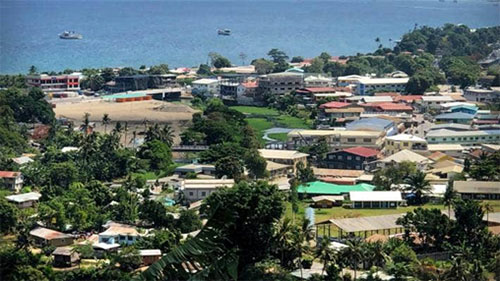Stop telling Pacific countries what to do

08 April 2022
Josie Pagani has worked in politics, aid and development. In 2011, she stood as a Labour candidate in Rangitikei.
OPINION: We are "gravely concerned" about the Solomon Islands' security deal with China.
How about we offer something better.
We say we're worried because the Pacific is our own ‘’backyard’'. The phrase is meant to signal a shared Pacific identity but, to the Pacific, the expression sounds colonial.
MARK SCHIEFELBEIN/AP
Ships are docked offshore in Honiara, the capital of the Solomon Islands. ‘’Our public condemnation of the Solomons' deal with China will push the Solomons further away, not bring it closer,’’ writes Josie Pagani.
Russia calls Ukraine its ‘’backyard’’. If you are opposed to Russia meddling in Ukraine, where Russia spuriously claims a ‘’security concern’’ about Ukraine joining Nato, then consistency demands you must also respect the Solomons' right to make its own decisions. We've not invading the country
We didn't like it when the Five Eyes intelligence network demanded we sign its statement condemning China for human rights abuses. Since the network attacked our independence from China for refusing to sign, our diplomatic ties to the US and Australia have weakened, not strengthened.
Likewise, our public condemnation of the Solomons' deal with China will push the Solomons further away, not bring it closer.
I'm not arguing we should be unconcerned about China's power plays in the Pacific, especially as they squeeze Taiwan. Ironically, China claims Taiwan as its own backyard, yet we support Taiwan's right to follow an independent path.
We would be more effective if we asked why the Solomons would do a security deal with China in the first place.
When I asked a friend in a Pacific government why it took Chinese loans, she told me: ‘’Your country says, ‘We've got a great idea for you’. The Chinese say, ‘What do you want?’ Of course we take their money.’’
Pacific countries that take loans from China often end up with sub-quality infrastructure they have paid for but can't use, and loans they can't repay.
The Cook Islands has taken legal action against China for failing to deliver a workable water system, and refuses to pay until the pipes are fixed. Good on it.
The Pacific is one of most indebted in the world. The International Monetary Fund says public debt in the Pacific was about 39 per cent of GDP in 2021, with Covid pushing the debt higher.
Debt makes countries vulnerable. China exerts pressure for votes in international organisations.
It’s also the most aid-dependent region in the world, when measuring aid flows as a percentage of GDP.
If we listened, it would be clear that what's important to Solomon Islands is security, not geopolitics. Recent riots in Honiara were about jobs. Too many unemployed young people with nothing to do, sick of watching imported Chinese workers get the jobs.
The Royal Solomon Islands Police Force couldn't cope, despite support from New Zealand and Australian police. So the government turned to China.
Security matters in the Pacific. Transnational crime, such as drug production and people trafficking, is serious in the region. Trafficking of methamphetamine, heroin, and cocaine is on the rise.
Why doesn't New Zealand double its aid to the Solomons to grow new businesses, and more jobs in legitimate industries?
Why not help the country negotiate better contracts with China that insist on local labour instead of shipping in Chinese workers?
We need to out-compete China. Not just yell ‘Get Off My Lawn’ at them.
Pacific leaders are challenging us to move on from the old welfare model of aid, and offer something the Chinese can't. Relationships.
We know each other. Some of us are family. When the Tongan volcano erupts, we feel it here. But talk of shared values isn’t enough. We need to be innovative about building new strength in the Pacific.
Perhaps it's time to bring back the idea of a Pacific Union. Not a cookie cutter version of the EU, but a Pacific version, building out from existing regional groups. A community of countries that live together, do business together and trade with the world.
The Pacific could set up a common fishing zone, with New Zealand contributing its expertise from our own fisheries settlement and quota management, says Josie Pagani. Credit: NZPA/Bill Gibson
The EU started with a common market agreement for coal and steel. The Pacific could start with a common fishing zone that would stretch across literally half of the world's largest, most abundant ocean.
We could contribute our expertise from our own fisheries settlement and quota management.
Bring businesses to the table. About 3200 Kiwi businesses work in the Pacific. In comparison, there are only 2500 Kiwi businesses working in China. We like to do business in the Pacific.
Before Covid, trade between New Zealand and the Pacific was worth $3.2 billion a year. We were importing more than $1.2b goods and services. About three times more than we give in aid.
There are many innovators in the aid sector and in government who are up for transforming our relationship with the Pacific. All we have to do is ask the Pacific, ‘’What do you need?’’
Cook Islands prime minister Mark Brown told a development conference this year that Covid has exacerbated fundamental problems in the delivery of aid to the Pacific.
‘’Left unaddressed, this will only hold back the region’s long term development ...This is our opportunity to put these things right.’’